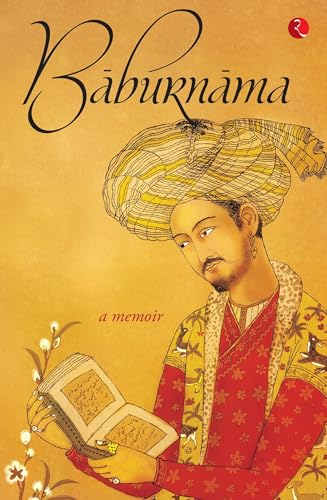 Baburnama
Baburnama

Il Bāburnāma (Chagatai/Persiano: بابر نامہ, letteralmente: "Libro di Bābur"; conosciuto anche come Tuzk-e Bāburī) è un'opera contenente le memorie di Ẓahīr ud-Dīn Muḥammad Bābur (1483–1530), fondatore dell'Impero Moghul e bis-bis-bisnipote di Tamerlano.
È un'opera autobiografica, scritta in lingua Chagatai, definita da Bābur "Turki" (ovvero turco), la lingua parlata cioè dai Timuridi di Andijan.
La prosa di Bābur è altamente persianizzata nella struttura della frase, nella morfologia e nel vocabolario, e contiene anche molte frasi e piccoli poemi in Lingua farsi.
Durante il regno dell'imperatore Akbar, il lavoro fu completamente tradotto in persiano da un cortigiano moghul, ʿAbd ul-Rahīm, nell'anno dell'Egira 998 (1589–90 EV).
Bābur fu educato alla maniera timuride e le sue osservazioni e i suoi commenti nelle sue memorie riflettono un interesse sulla natura, la società, la politica e l'economia.
Il resoconto degli eventi copre non solo la sua vita, ma anche la storia e la geografia delle aree in cui Bābur viveva, la loro flora e fauna, come pure i popoli con cui entrò in contatto.
|
|
Baburnama (Memoirs of Babur) contains the memoirs of Zahir-ud-Din Muhammad Babur (14831530), the founder of the Mughal Empire in India and a great-great-great-grandson of Timur. It is an autobiographical work, written in Turki, the spoken language of the Andijan-Timurids.
The prose, though highly Persianized in its sentence structure, morphology and vocabulary, makes an interesting read. It is a widely translated work and is part of textbooks in over 25 countries, mostly in Central, Western, and Southern Asia. It was first translated by John Leyden and William Erskine, and later by the British orientalist scholar, Annette Susannah Beveridge (1842-1929).
The book (in two volumes) describes Babur's fluctuating fortunes as a minor ruler in Central Asia, in which he took and lost Samarkand twice, and his move to Kabul in 1504. There is a break in the manuscript for 12 years starting from 1508. By 1519, Babur was established in Kabul and from there he launched an invasion into Northwestern India.
The final section of the book covers the years 1525 to 1529 and the establishment of the Mughal empire in India, where Babur's descendants ruled for three centuries.
A translation of Babur's personal memoir written in Turki, Baburnama remains true to the original, portraying the extraordinary life of the founder of the Mughal Empire in India. Often quoted by historians and academicians alike, this book possesses the rare distinction of being relevant across centuries. Baburnama is the complete record of Babur's life from the time he ascended the throne at the young age of eleven to when he finally established himself as a monarch (1493 to 1529).
What fascinates readers even today is Babur's intimate and detailed account of the world around him and what is truly astonishing is that there is no historical precedent for his narrative, making it the first real autobiography in Islamic literature. Annette Susannah Beveridge's nuanced translation offers us a unique insight into this remarkable period in history. |